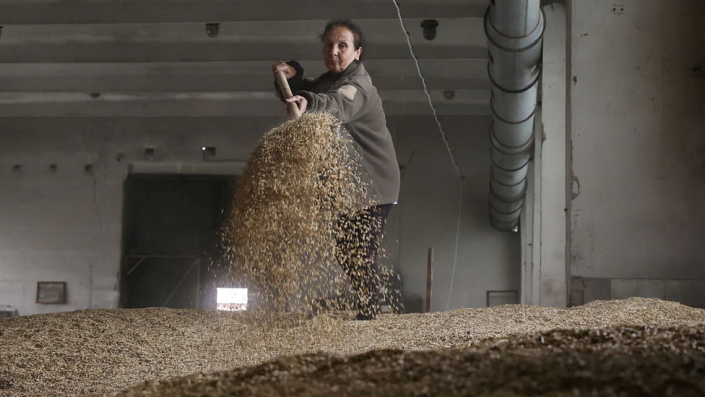
Ukraine’s central bank has far more than doubled its curiosity charge to 25% to the highest amount for any European country.
The move is supposed to sluggish soaring inflation and reduce a even more collapse of its currency subsequent Russia’s invasion in February.
Organizations have been compelled to shut and important offer chains have been slice off given that the war began.
The Planet Lender predicts that Ukraine’s financial state could shrink by as significantly as 45% this calendar year.
The rate of inflation – or the expense of residing – has risen to 17% in Ukraine and is on monitor to hit 20% this year, in accordance to the country’s central bank.
The National Lender of Ukraine mentioned the benchmark interest charge improve – from 10% to 25% – would assistance safeguard citizens’ cost savings from getting eaten by soaring inflation.
Ukraine’s forex, the hryvnia, has also arrive under significant strain considering that Russia’s invasion, falling sharply in value. The central financial institution said it hoped the fee rise would ease some of that strain and stabilise the forex.
It is Ukraine’s first rate increase because the war broke out, with the lender signalling it would move to decrease prices once more once inflation was again less than handle.
Additional than $100bn of infrastructure hurt to Ukrainian metropolitan areas has been induced by artillery fireplace and airstrikes, according to the Kyiv School of Economics, although 14 million citizens have been pressured to flee their homes.
To mount its army defence, and assist citizens who have misplaced their livelihoods, the govt has speedily greater its expending, pushing the spending budget deficit up 27% thirty day period on thirty day period to $7.7bn in May perhaps, in accordance to Kyiv-based mostly expense financial institution Dragon Funds.
Financial institutions have also been forced to settle for that financial loans created to firms in territory now controlled by Russia will probably in no way be repaid, a different big economic blow to the country’s financial state.
“The most probable state of affairs is that almost all corporate and retail loans in the territories that are even now occupied will be shed,” mentioned Vitaliy Vavryshchuk, head of macro investigate at asset manager Financial commitment Cash Ukraine.
Important exports
Friday marks 100 times given that Russia invaded neighbouring Ukraine, with 4,500 civilians killed due to the fact preventing broke out. Hospitals and educational institutions have been devastated, even though ports have been blockaded, slicing Ukraine off from the exports that variety the spine of its financial system.
About 50% of the world’s provide of neon fuel, important for generating the microchips that electricity smartphones and cars, comes from just two Ukrainian corporations.
In addition, a lot more than 18% of world-wide barley exports, 16% of corn, and 12% of wheat, come from Ukraine’s fields.

“The meals disaster truly threatens up to 1.4 billion people that are likely to experience foodstuff shortages and even famine in some destinations,” Amin Awad, the UN crisis coordinator for Ukraine advised the BBC’s Now programme.
“The food is stranded in Ukraine. It generates 85 million tonnes of grain just about every year.”
With one more massive harvest coming up in July and August this year, Mr Awad warned that if grain silos – at present comprehensive with foods – can’t be cleared, crops would rot in the fields for the reason that there would be no location to retail store them.
Egypt, which prior to the war been given about 80% of its wheat from Russia and Ukraine, is at this time experiencing shortages, and warned that “tens of millions” could die globally.
In the meantime, in Turkey inflation surged to a 24-calendar year large of 73.5% in the year to May possibly, pushed by the war in Ukraine, a weak forex and significant strength price ranges.
Food costs have skyrocketed by 92% more than the past year in Turkey, creating basic items unaffordable for quite a few irrespective of governing administration interventions.




